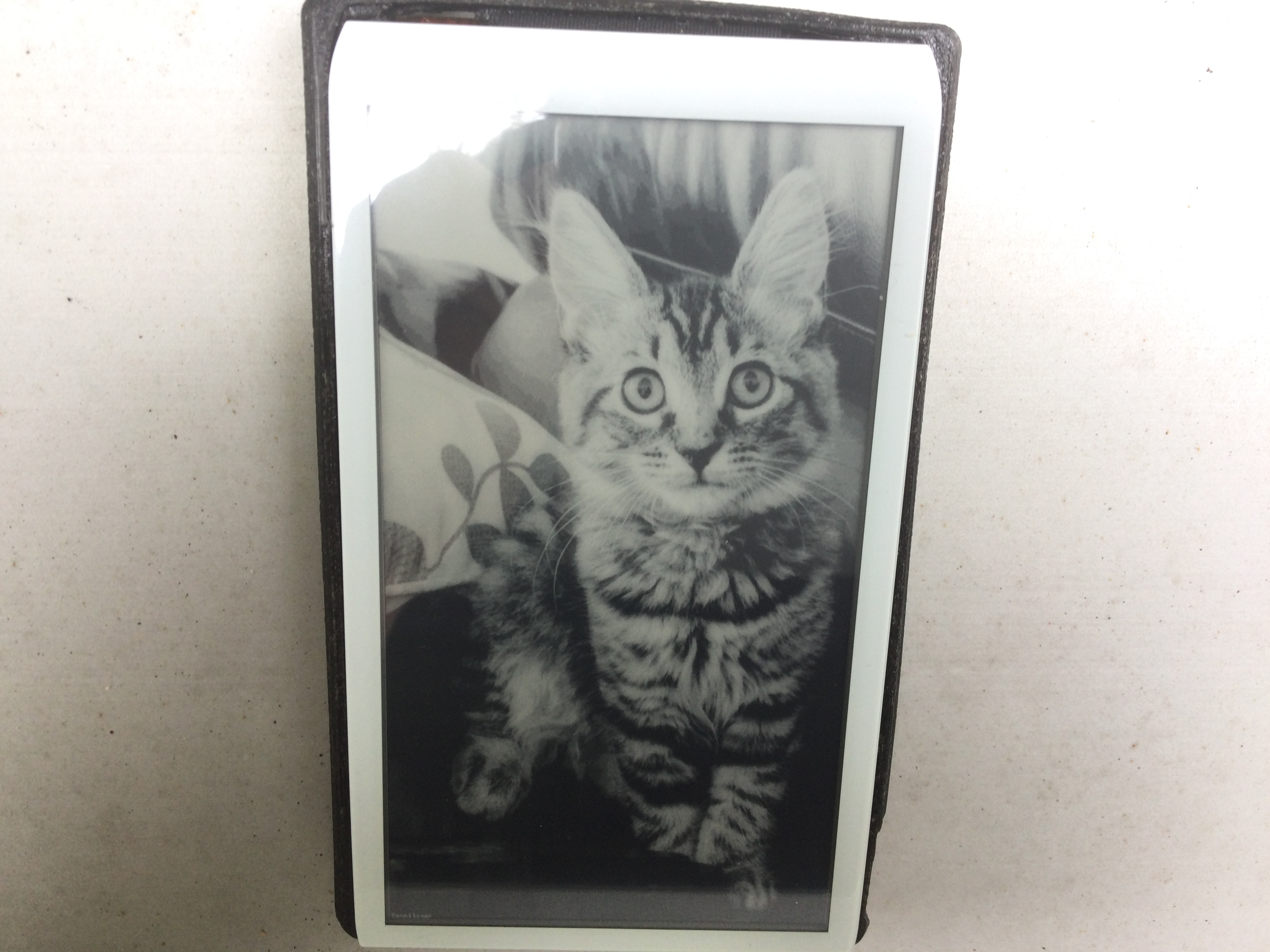https://github.com/martinberlin/cale-id ... jpg-render
There I made 3 examples I would like to share here:
jpg-render.cpp Takes aprox. 1.5 to 2 seconds to download a 200Kb jpeg. Uses a decoded image buffer and has optional JPG dithering (Better to the eye in grayscale transitions) supports monochrome epaper version. Has auto-centering for smaller images.
jpg-render-v2.cpp Takes less time since does not uses a decoded_buffer. Uses less RAM and is faster but it looses dithering functionality and auto-centering.
jpgdec-render.cpp Is the faster since uses @bitbank/JPEGDECODER. Comes already with 4BIT dithering included so it outperforms jpg-render.cpp it has a mode where the decoded buffer is streamed directly with memcpy to the Epaper framebuffer so rendering a 960*540 pix JPG is done in 3 ms.

Example code: TJPGD download and render
Code: Select all
// Note: Run menuconfig to set the WiFi Credentials -> CALE Configuration
// Requirements: Needs to have an EPD Class defined. Needs PSRAM.
// This example does not use a decoded buffer hence leaves more external RAM free
// At the same time it looses the JPG_DITHER functionality in favour of render speed.
// As default only configured for parallel epapers
#include "esp_heap_caps.h"
#include "esp_log.h"
#include "esp_timer.h"
#include "esp_types.h"
#include "freertos/FreeRTOS.h"
#include "freertos/task.h"
#include "freertos/event_groups.h"
#include "esp_sleep.h"
// WiFi related
#include "esp_wifi.h"
#include "esp_event.h"
#include "esp_log.h"
#include "nvs_flash.h"
#include "lwip/err.h"
#include "lwip/sys.h"
// HTTP Client + time
#include "esp_netif.h"
#include "esp_http_client.h"
#include "esp_sntp.h"
// JPG decoder
#if ESP_IDF_VERSION_MAJOR >= 4 // IDF 4+
#include "esp32/rom/tjpgd.h"
#else // ESP32 Before IDF 4.0
#include "rom/tjpgd.h"
#endif
#include "esp_task_wdt.h"
#include <stdio.h>
#include <string.h>
#include <math.h> // round + pow
// - - - - Display configuration - - - - - - - - -
// EPDiy epd_driver parallel class. Requires:
// idf.py menuconfig-> Component Config -> E-Paper driver and select:
// Display type: LILIGO 4.7 ED047TC1
// Board: LILIGO T5-4.7 Epaper
// Make sure that components/CalEPD requires epd_driver in CMakeLists.txt
#include "parallel/ED047TC1.h" // Lilygo EPD47 parallel
Ed047TC1 display;
// - - - - end of Display configuration - - - - -
extern "C"
{
void app_main();
}
// Image URL and jpg settings. Make sure to update EPD_WIDTH/HEIGHT if using loremflickr
// Note: Only HTTP protocol supported (Check README to use SSL secure URLs) loremflickr
#define STR_HELPER(x) #x
#define STR(x) STR_HELPER(x)
#define EPD_WIDTH 540
#define EPD_HEIGHT 960
#define IMG_URL ("https://loremflickr.com/" STR(EPD_WIDTH) "/" STR(EPD_HEIGHT))
// CALE url test (should match width/height of your EPD)
//#define IMG_URL "http://img.cale.es/jpg/fasani/5ea1dec401890" // 800*480 test
// Please check the README to understand how to use an SSL Certificate
// Note: This makes a sntp time sync query for cert validation (It's slower)
#define VALIDATE_SSL_CERTIFICATE false
// Affects the gamma to calculate gray (lower is darker/higher contrast)
// Nice test values: 0.9 1.2 1.4 higher and is too bright
double gamma_value = 0.8;
// As default is 512 without setting buffer_size property in esp_http_client_config_t
#define HTTP_RECEIVE_BUFFER_SIZE 1938
// Load the EMBED_TXTFILES. Then doing (char*) server_cert_pem_start you get the SSL certificate
// Reference: https://docs.espressif.com/projects/esp-idf/en/latest/esp32/api-guides/build-system.html#embedding-binary-data
extern const uint8_t server_cert_pem_start[] asm("_binary_server_cert_pem_start");
#define DEBUG_VERBOSE false
// JPEG decoder
JDEC jd;
JRESULT rc;
// Buffers
uint8_t *fb; // EPD 2bpp buffer
uint8_t *source_buf; // JPG download buffer
uint8_t *decoded_image; // RAW decoded image
static uint8_t tjpgd_work[3096]; // tjpgd buffer. min size: 3096 bytes
uint32_t buffer_pos = 0;
uint32_t time_download = 0;
uint32_t time_decomp = 0;
uint32_t time_render = 0;
static const char * jd_errors[] = {
"Succeeded",
"Interrupted by output function",
"Device error or wrong termination of input stream",
"Insufficient memory pool for the image",
"Insufficient stream input buffer",
"Parameter error",
"Data format error",
"Right format but not supported",
"Not supported JPEG standard"
};
uint16_t ep_width = 0;
uint16_t ep_height = 0;
uint8_t gamme_curve[256];
static const char *TAG = "EPDiy";
uint16_t countDataEventCalls = 0;
uint32_t countDataBytes = 0;
uint32_t img_buf_pos = 0;
uint32_t dataLenTotal = 0;
uint64_t startTime = 0;
#if VALIDATE_SSL_CERTIFICATE == true
/* Time aware for ESP32: Important to check SSL certs validity */
void time_sync_notification_cb(struct timeval *tv)
{
ESP_LOGI(TAG, "Notification of a time synchronization event");
}
static void initialize_sntp(void)
{
ESP_LOGI(TAG, "Initializing SNTP");
sntp_setoperatingmode(SNTP_OPMODE_POLL);
sntp_setservername(0, "pool.ntp.org");
sntp_set_time_sync_notification_cb(time_sync_notification_cb);
#ifdef CONFIG_SNTP_TIME_SYNC_METHOD_SMOOTH
sntp_set_sync_mode(SNTP_SYNC_MODE_SMOOTH);
#endif
sntp_init();
}
static void obtain_time(void)
{
initialize_sntp();
// wait for time to be set
time_t now = 0;
struct tm timeinfo = { 0 };
int retry = 0;
const int retry_count = 10;
while (sntp_get_sync_status() == SNTP_SYNC_STATUS_RESET && ++retry < retry_count) {
ESP_LOGI(TAG, "Waiting for system time to be set... (%d/%d)", retry, retry_count);
vTaskDelay(2000 / portTICK_PERIOD_MS);
}
time(&now);
localtime_r(&now, &timeinfo);
}
#endif
//====================================================================================
// This sketch contains support functions to render the Jpeg images
//
// Created by Bodmer 15th Jan 2017
// Refactored by @martinberlin for EPDiy as a Jpeg download and render example
//====================================================================================
// Return the minimum of two values a and b
#define minimum(a,b) (((a) < (b)) ? (a) : (b))
uint8_t find_closest_palette_color(uint8_t oldpixel)
{
return oldpixel & 0xF0;
}
void deepsleep(){
esp_deep_sleep(1000000LL * 60 * CONFIG_DEEPSLEEP_MINUTES_AFTER_RENDER);
}
static uint32_t feed_buffer(JDEC *jd,
uint8_t *buff, // Pointer to the read buffer (NULL:skip)
uint32_t nd
) {
uint32_t count = 0;
while (count < nd) {
if (buff != NULL) {
*buff++ = source_buf[buffer_pos];
}
count ++;
buffer_pos++;
}
return count;
}
/* User defined call-back function to output decoded RGB bitmap in decoded_image buffer
In this v2 example the pixels are set directly on tjd_output without using a decoded buffer
*/
static uint32_t
tjd_output(JDEC *jd, /* Decompressor object of current session */
void *bitmap, /* Bitmap data to be output */
JRECT *rect /* Rectangular region to output */
) {
esp_task_wdt_reset();
uint32_t w = rect->right - rect->left + 1;
uint32_t h = rect->bottom - rect->top + 1;
uint32_t image_width = jd->width;
uint8_t *bitmap_ptr = (uint8_t*)bitmap;
for (uint32_t i = 0; i < w * h; i++) {
uint8_t r = *(bitmap_ptr++);
uint8_t g = *(bitmap_ptr++);
uint8_t b = *(bitmap_ptr++);
// Calculate weighted grayscale
//uint32_t val = ((r * 30 + g * 59 + b * 11) / 100); // original formula
uint32_t val = (r*38 + g*75 + b*15) >> 7; // @vroland recommended formula
int xx = rect->left + i % w;
if (xx < 0 || xx >= image_width) {
continue;
}
int yy = rect->top + i / w;
if (yy < 0 || yy >= jd->height) {
continue;
}
// Write the pixel directly
display.drawPixel(xx, yy, gamme_curve[val]);
}
return 1;
}
//====================================================================================
// This function opens source_buf Jpeg image file and primes the decoder
//====================================================================================
int drawBufJpeg(uint8_t *source_buf, int xpos, int ypos) {
rc = jd_prepare(&jd, feed_buffer, tjpgd_work, sizeof(tjpgd_work), &source_buf);
if (rc != JDR_OK) {
ESP_LOGE(TAG, "JPG jd_prepare error: %s", jd_errors[rc]);
return ESP_FAIL;
}
uint32_t decode_start = esp_timer_get_time();
// Last parameter scales v 1 will reduce the image
rc = jd_decomp(&jd, tjd_output, 0);
if (rc != JDR_OK) {
ESP_LOGE(TAG, "JPG jd_decomp error: %s", jd_errors[rc]);
return ESP_FAIL;
}
time_decomp = (esp_timer_get_time() - decode_start)/1000;
ESP_LOGI("JPG", "width: %d height: %d\n", jd.width, jd.height);
ESP_LOGI("decode", "%d ms . image decompression", time_decomp);
// Render the image onto the screen at given coordinates
//jpegRender(xpos, ypos, jd.width, jd.height);
return 1;
}
// Handles Htpp events and is in charge of buffering source_buf (jpg compressed image)
esp_err_t _http_event_handler(esp_http_client_event_t *evt)
{
switch (evt->event_id)
{
case HTTP_EVENT_ERROR:
ESP_LOGE(TAG, "HTTP_EVENT_ERROR");
break;
case HTTP_EVENT_ON_CONNECTED:
ESP_LOGI(TAG, "HTTP_EVENT_ON_CONNECTED");
break;
case HTTP_EVENT_HEADER_SENT:
ESP_LOGI(TAG, "HTTP_EVENT_HEADER_SENT");
break;
case HTTP_EVENT_ON_HEADER:
#if DEBUG_VERBOSE
ESP_LOGI(TAG, "HTTP_EVENT_ON_HEADER, key=%s, value=%s", evt->header_key, evt->header_value);
#endif
break;
case HTTP_EVENT_ON_DATA:
++countDataEventCalls;
#if DEBUG_VERBOSE
if (countDataEventCalls%10==0) {
ESP_LOGI(TAG, "%d len:%d\n", countDataEventCalls, evt->data_len);
}
#endif
dataLenTotal += evt->data_len;
if (countDataEventCalls == 1) startTime = esp_timer_get_time();
// Append received data into source_buf
memcpy(&source_buf[img_buf_pos], evt->data, evt->data_len);
img_buf_pos += evt->data_len;
// Optional hexa dump
//ESP_LOG_BUFFER_HEX(TAG, source_buf, 100);
break;
case HTTP_EVENT_ON_FINISH:
// Do not draw if it's a redirect (302)
if (esp_http_client_get_status_code(evt->client) == 200) {
printf("%d bytes read from %s\nIMG_BUF size: %d\n", img_buf_pos, IMG_URL, img_buf_pos);
drawBufJpeg(source_buf, 0, 0);
time_download = (esp_timer_get_time()-startTime)/1000;
ESP_LOGI("www-dw", "%d ms - download", time_download);
// Refresh display
display.update();
ESP_LOGI("total", "%d ms - total time spent\n", time_download+time_decomp+time_render);
} else {
printf("HTTP on finish got status code: %d\n", esp_http_client_get_status_code(evt->client));
}
break;
case HTTP_EVENT_DISCONNECTED:
ESP_LOGI(TAG, "HTTP_EVENT_DISCONNECTED\n");
break;
}
return ESP_OK;
}
// Handles http request
static void http_post(void)
{
/**
* NOTE: All the configuration parameters for http_client must be specified
* either in URL or as host and path parameters.
* FIX: Uncommenting cert_pem restarts even if providing the right certificate
*/
esp_http_client_config_t config = {
.url = IMG_URL,
.disable_auto_redirect = false,
.event_handler = _http_event_handler,
.buffer_size = HTTP_RECEIVE_BUFFER_SIZE,
#if VALIDATE_SSL_CERTIFICATE == true
.cert_pem = (char *)server_cert_pem_start
#endif
};
esp_http_client_handle_t client = esp_http_client_init(&config);
#if DEBUG_VERBOSE
printf("Free heap before HTTP download: %d\n", xPortGetFreeHeapSize());
if (esp_http_client_get_transport_type(client) == HTTP_TRANSPORT_OVER_SSL && config.cert_pem) {
printf("SSL CERT:\n%s\n\n", (char *)server_cert_pem_start);
}
#endif
esp_err_t err = esp_http_client_perform(client);
if (err == ESP_OK)
{
ESP_LOGI(TAG, "\nIMAGE URL: %s\n\nHTTP GET Status = %d, content_length = %d\n",
IMG_URL,
esp_http_client_get_status_code(client),
esp_http_client_get_content_length(client));
}
else
{
ESP_LOGE(TAG, "\nHTTP GET request failed: %s", esp_err_to_name(err));
}
printf("Go to sleep %d minutes\n", CONFIG_DEEPSLEEP_MINUTES_AFTER_RENDER);
esp_http_client_cleanup(client);
vTaskDelay(10);
deepsleep();
}
/* FreeRTOS event group to signal when we are connected*/
static EventGroupHandle_t s_wifi_event_group;
/* The event group allows multiple bits for each event, but we only care about two events:
* - we are connected to the AP with an IP
* - we failed to connect after the maximum amount of retries */
#define WIFI_CONNECTED_BIT BIT0
#define WIFI_FAIL_BIT BIT1
static int s_retry_num = 0;
static void event_handler(void *arg, esp_event_base_t event_base,
int32_t event_id, void *event_data)
{
if (event_base == WIFI_EVENT && event_id == WIFI_EVENT_STA_START)
{
esp_wifi_connect();
}
else if (event_base == WIFI_EVENT && event_id == WIFI_EVENT_STA_DISCONNECTED)
{
if (s_retry_num < 5)
{
esp_wifi_connect();
s_retry_num++;
ESP_LOGI(TAG, "Retry to connect to the AP");
}
else
{
xEventGroupSetBits(s_wifi_event_group, WIFI_FAIL_BIT);
ESP_LOGI(TAG, "Connect to the AP failed %d times. Going to deepsleep %d minutes", 5, CONFIG_DEEPSLEEP_MINUTES_AFTER_RENDER);
deepsleep();
}
}
else if (event_base == IP_EVENT && event_id == IP_EVENT_STA_GOT_IP)
{
s_retry_num = 0;
xEventGroupSetBits(s_wifi_event_group, WIFI_CONNECTED_BIT);
}
}
// Initializes WiFi the ESP-IDF way
void wifi_init_sta(void)
{
s_wifi_event_group = xEventGroupCreate();
ESP_ERROR_CHECK(esp_netif_init());
ESP_ERROR_CHECK(esp_event_loop_create_default());
esp_netif_create_default_wifi_sta();
wifi_init_config_t cfg = WIFI_INIT_CONFIG_DEFAULT();
ESP_ERROR_CHECK(esp_wifi_init(&cfg));
esp_event_handler_instance_t instance_any_id;
esp_event_handler_instance_t instance_got_ip;
ESP_ERROR_CHECK(esp_event_handler_instance_register(WIFI_EVENT,
ESP_EVENT_ANY_ID,
&event_handler,
NULL,
&instance_any_id));
ESP_ERROR_CHECK(esp_event_handler_instance_register(IP_EVENT,
IP_EVENT_STA_GOT_IP,
&event_handler,
NULL,
&instance_got_ip));
// C++ wifi config
wifi_config_t wifi_config;
memset(&wifi_config, 0, sizeof(wifi_config));
wifi_config.sta.threshold.authmode = WIFI_AUTH_WPA2_PSK;
sprintf(reinterpret_cast<char *>(wifi_config.sta.ssid), CONFIG_ESP_WIFI_SSID);
sprintf(reinterpret_cast<char *>(wifi_config.sta.password), CONFIG_ESP_WIFI_PASSWORD);
wifi_config.sta.pmf_cfg.capable = true;
ESP_ERROR_CHECK(esp_wifi_set_mode(WIFI_MODE_STA));
ESP_ERROR_CHECK(esp_wifi_set_config((wifi_interface_t)ESP_IF_WIFI_STA, &wifi_config));
ESP_ERROR_CHECK(esp_wifi_start());
ESP_LOGI(TAG, "wifi_init_sta finished.");
/* Waiting until either the connection is established (WIFI_CONNECTED_BIT) or connection failed for the maximum
* number of re-tries (WIFI_FAIL_BIT). The bits are set by event_handler() (see above) */
EventBits_t bits = xEventGroupWaitBits(s_wifi_event_group,
WIFI_CONNECTED_BIT | WIFI_FAIL_BIT,
pdFALSE,
pdFALSE,
portMAX_DELAY);
/* xEventGroupWaitBits() returns the bits before the call returned, hence we can test which event actually happened. */
if (bits & WIFI_CONNECTED_BIT)
{
ESP_LOGI(TAG, "Connected to ap SSID:%s", CONFIG_ESP_WIFI_SSID);
}
else if (bits & WIFI_FAIL_BIT)
{
ESP_LOGI(TAG, "Failed to connect to SSID:%s", CONFIG_ESP_WIFI_SSID);
}
else
{
ESP_LOGE(TAG, "UNEXPECTED EVENT");
}
/* The event will not be processed after unregister */
ESP_ERROR_CHECK(esp_event_handler_instance_unregister(IP_EVENT, IP_EVENT_STA_GOT_IP, instance_got_ip));
ESP_ERROR_CHECK(esp_event_handler_instance_unregister(WIFI_EVENT, ESP_EVENT_ANY_ID, instance_any_id));
vEventGroupDelete(s_wifi_event_group);
}
void app_main() {
ep_width = display.width();
ep_height = display.height();
// Should be big enough to allocate the JPEG file size, width * height should suffice
source_buf = (uint8_t *)heap_caps_malloc(ep_width * ep_height, MALLOC_CAP_SPIRAM);
if (source_buf == NULL) {
ESP_LOGE("main", "Initial alloc source_buf failed!");
}
printf("Free heap after buffers allocation: %d\n", xPortGetFreeHeapSize());
display.init();
display.setRotation(CONFIG_DISPLAY_ROTATION);
double gammaCorrection = 1.0 / gamma_value;
for (int gray_value =0; gray_value<256;gray_value++)
gamme_curve[gray_value]= round (255*pow(gray_value/255.0, gammaCorrection));
// Initialize NVS
esp_err_t ret = nvs_flash_init();
if (ret == ESP_ERR_NVS_NO_FREE_PAGES || ret == ESP_ERR_NVS_NEW_VERSION_FOUND)
{
ESP_ERROR_CHECK(nvs_flash_erase());
ret = nvs_flash_init();
}
ESP_ERROR_CHECK(ret);
// WiFi log level set only to Error otherwise outputs too much
esp_log_level_set("wifi", ESP_LOG_ERROR);
display.clearScreen();
// Initialization: WiFi + clean screen while downloading image
printf("Free heap before wifi_init_sta: %d\n", xPortGetFreeHeapSize());
wifi_init_sta();
#if VALIDATE_SSL_CERTIFICATE == true
obtain_time();
#endif
http_post();
}

